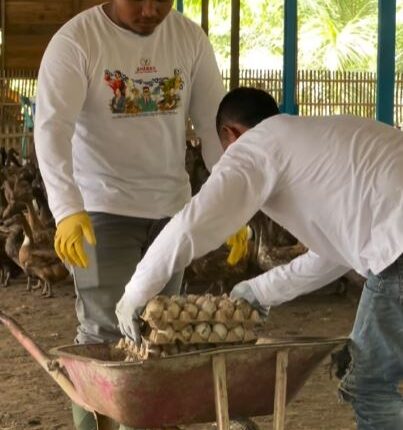Encouraging Livestock Program, AMANAH Optimally Supports President Jokowi in Developing Youth Welfare
By: Rahmat Fadillah
The Aneuk Muda Aceh Unggul dan Hebat (AMANAH) program continues to demonstrate its role in promoting the welfare of Acehnese youth. This Human Resources (HR) development program, initiated by the State Intelligence Agency (BIN), has various leading initiatives that focus on strengthening the local economy.
One of the initiatives that is currently running successfully is the development of the livestock sector, especially organic laying ducks and laying hens, which involves Acehnese youth in efforts to improve skills, independence and contribution to the local economy.
Through various programs, AMANAH has made a real contribution in empowering youth. The ongoing livestock program provides technical training, modern livestock management, and facilitates marketing of production results. This initiative is in line with President Jokowi’s vision which focuses on the people’s economy and youth empowerment through improving work skills. This effort also underlines the government’s commitment to strengthening the agricultural sector, which is one of the backbones of the national economy.
Lukman Hakim, a student and manager of a duck egg farm involved in the program, explained that AMANAH has provided many benefits for young farmers.
The innovation brings the latest equipment and technology that facilitates the livestock process. Program participants can now manage their businesses more efficiently, increase productivity, and ensure quality livestock products that are more competitive in local and national markets.
The egg-laying duck farming program that was developed not only includes technical training in terms of cage management and animal health, but also emphasizes modern business management.
The program provides young farmers with the skills to compete in an increasingly competitive market, while improving their welfare by increasing the quality and quantity of production.
In addition, AMANAH has also launched an organic egg-laying chicken farming program through a collaboration with Hanasa Farm. This program is designed to encourage young farmers to develop their businesses in the environmentally friendly livestock sector.
Muliadi, a young farmer involved in the program, explained that the assistance in the form of chicken coops, seeds, feed, and medicines provided by AMANAH has enabled farmers to increase their production capacity. The program aims not only to meet local market needs, but also to promote sustainable farming practices.
Furthermore, the livestock program is expected to create a significant impact on the local economy. By focusing on organic duck and laying hen farming, the community’s need for quality livestock products can be better met.
In addition, the program provides wider access for young farmers to reach national and even international markets. This not only increases their income but also contributes to the stability of the regional economy.
On the other hand, the government is also increasingly actively integrating the agricultural sector with financial inclusion. Ferry Irawan, as Deputy for Macroeconomic and Financial Coordination and Chair of the Secretariat of the National Council for Financial Inclusion (DNKI), said that the government is committed to continuing to develop financial literacy and entrepreneurial skills, especially for livestock farmers. Increasing capacity through knowledge transfer, technology, and partnership assistance is expected to accelerate the transformation of an inclusive and productive economy.
Efforts to expand access to financing through the People’s Business Credit (KUR) program with low interest rates are also one of the government’s priorities. Digitalization in financial management is considered one of the solutions to encourage financial inclusion, which in turn will accelerate economic activity as a whole. This digitalization also allows smallholder farmers to access financial services more easily, supporting their businesses to be more competitive.
Meanwhile, village development under President Jokowi’s leadership continues to have a positive impact on communities in various regions. Samsiar, Head of the APDESI DPC Tanah Laut Regency, acknowledged that equitable development in villages is increasingly visible, especially with the ongoing distribution of village funds. The funds are used to improve various sectors, including agriculture and plantations, which support local economic development.
As part of the national strategy, the AMANAH program which focuses on empowering Acehnese youth through the livestock sector has become one of the successful examples in efforts to improve community welfare.
The program, which is in line with the vision of the seventh President of the Republic of Indonesia, not only encourages local economic growth, but also empowers the younger generation to be independent and competitive in the national and international arena. Human resource development through AMANAH shows that investing in today’s youth will be the foundation for building a stronger nation in the future.
The livestock program is not just an economic development project, but also a social transformation that will shape the face of Aceh’s future. Through this effort, the government and people of Aceh are collaborating to create sustainable and equitable prosperity.
*) Acehnese Culture and History Researcher – Greater Aceh Cultural Heritage Institute
